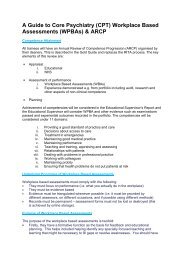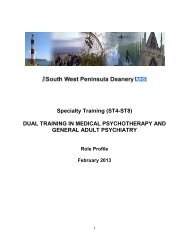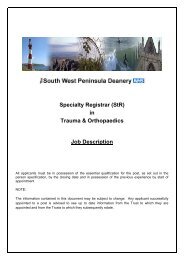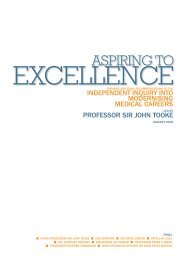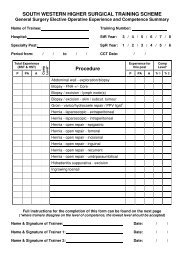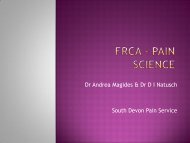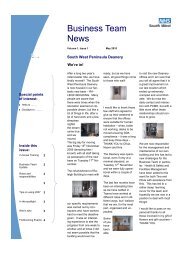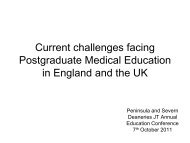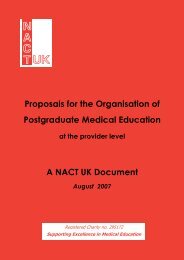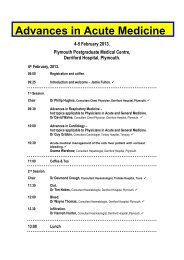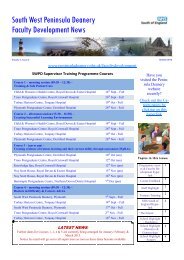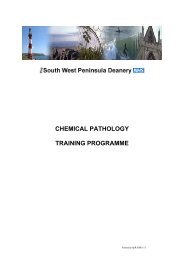FRCA Final Course SW Peninsula
FRCA Final Course SW Peninsula
FRCA Final Course SW Peninsula
Create successful ePaper yourself
Turn your PDF publications into a flip-book with our unique Google optimized e-Paper software.
Dr Mel Hearn<br />
Director of Education<br />
9 th May 2012
Pass rate for written exam ~ 60% (57-66)<br />
(~70% for MCQ)<br />
60% pass first time and 22% second time<br />
Females more likely to pass written<br />
Pass rate for SOE ~ 62% (59-71)<br />
62% pass first time and 19% second time<br />
Males more likely to pass SOE<br />
Most often passed at ST3 grade<br />
Likelihood of pass: UK grad. > Europe > Other<br />
Good reliability scores for Qs each year
Aim to examine your application of knowledge<br />
Knowledge based competencies in intermediate<br />
curriculum<br />
http://www.rcoa.ac.uk/index.asp?PageID=1479 choose Annex C Intermediate Training 2010<br />
http://www.frca.co.uk/Documents/<strong>Final</strong>_Syllabus.pdf<br />
Knowledge from basic units of training<br />
especially clinical science<br />
A/A and choose Annex B Basic Training 2010<br />
General medical and surgical knowledge<br />
Recent guidelines and recommendations<br />
eg RCoA, AAGBI, NICE, NCEPOD<br />
This measures professionalism:<br />
keeping up to date with RECENT reports
Written<br />
Short Answer Questions (SAQ)<br />
MCQ<br />
Structured Oral Examination<br />
Clinical Anaesthesia<br />
Clinical Science
12 in 3 hours = 15 Mins per question<br />
Examine: Judgement<br />
Prioritisation<br />
Ability to summarise<br />
Present an argument<br />
20 marks per Q - all on content now<br />
Needs to be legible<br />
Sections divided with % marks allocated<br />
6 books with 2 Qs per book
Examiners submit Qs, 12 selected for paper<br />
Refined and answer template fits on 1 page<br />
Standard set 6/52 before → prelim Pass mark<br />
Pass mark = that of a borderline candidate<br />
Examiner generated pass mark ↓ by 1 SE<br />
Examiners mark specimen papers to calibrate<br />
6-8 examiners/book of 2 Qs, 60-80 books each<br />
6 examiners mark each paper - ↓ variability<br />
Marks checked for mistakes and stats analysed
READ the question: only answer what is ASKED!<br />
Consider how marks are awarded<br />
Do what you are asked ie. list=list<br />
Thinking/planning time 3-5 mins per Q<br />
Writing 10-12 mins per Q<br />
Divide time equally between Qs<br />
Write clearly, about 2 pages per Q<br />
Indicate sub-headings clearly<br />
2 Qs per booklet: ensure using correct book<br />
PRACTICE UNDER EXAM CONDITIONS
90 stem Q in 3 hours<br />
NO NEGATIVE MARKING ... Answer them all!!<br />
Testing knowledge<br />
60 Multiple true false (MTF) - facts<br />
30 Single best answer (SBA) – facts in context<br />
Pass mark determined with Anghoff referencing<br />
High validity: fair and reliable<br />
Overall pass mark 70-75%<br />
PRACTICE!!!
MTF<br />
Stem and 5 Qs<br />
20 Medicine/surgery<br />
20 applied basic science<br />
and clinical measurement<br />
15 ICM<br />
5 Pain<br />
SBA<br />
Question stem + 5 choices<br />
20 clinical anaesthesia<br />
5 ICM<br />
5 Pain
Passed the written in preceding 2 years<br />
Ensure that you have enough experience<br />
6 attempts allowed<br />
Aim to question at ST3/4 level<br />
2 exams, am and pm<br />
4 sessions per half day, same Qs for all in a<br />
session<br />
May have observer/auditor present<br />
If you know an examiner say immediately<br />
All examiners have done >3 years as 1° examiner
Clinical Anaesthesia, 50 mins:<br />
• Practical Knowledge<br />
• Interpretation of investigations<br />
• Peri-op planning<br />
• Includes knowledge of surgery<br />
Clinical Science as applied to practice, 30 mins:<br />
• Anatomy<br />
• Physiology<br />
• Pharmacology<br />
• Clinical measurement
2 examiners, mark you separately<br />
Score for 10 sections<br />
0 - very limited knowledge/understanding of topic<br />
1 - Incomplete/partial knowledge/understanding<br />
2 - Satisfactory knowledge/understanding of topic<br />
32/40 and above is a pass<br />
All sections and marks are equal<br />
Clinical anaesthesia: 6 sections = 24 total<br />
Clinical science: 4 sections = 16 total
First part of the exam, 50 mins in total<br />
10 mins to review a ‘long’ case + investigations<br />
General, ICM or Pain<br />
→USE YOUR TIME WISELY! Make notes<br />
20 mins with 1 examiner; 3 sections, each marked<br />
Often discuss pre-op, intra-op and post-op<br />
Succinct summary at beginning<br />
Intro and guided outline, no right/wrong<br />
Voice an opinion and justify<br />
Looking for judgement and decision making
20 mins, 3 cases, 7mins each (other examiner)<br />
Up to 2 marks/examiner/case: total = 12<br />
Include all specialties, ICM and pain<br />
(cardiac/neuro/paeds/obs)<br />
Try to give answers that reflect clinical practice<br />
Be succinct and get to the point!<br />
Be systematic with analysis of investigations<br />
and state what the abnormality is<br />
Practice by discussing cases that you<br />
come across like this
PM, 30 mins, 2 x 15 mins with each examiner<br />
4 Qs in total, 2 marks each: Total marks = 16<br />
Basic science (A/P/P/measurement) + guidelines<br />
As applied to Anaesthesia/ICM/acute & chronic pain<br />
Co-ordinated with other exams to reduce duplication<br />
Knowledge that underpins your judgements<br />
Start with clinical opening Q but will announce which<br />
discipline they will focus on at start<br />
Have supplementary Qs to guide exam<br />
May use computer screen to show XR/artefacts
Anatomy:<br />
• Organs/nerves/vessels & heart/CNS<br />
• Anaesthetics/IMC/pain/obs/paeds<br />
• Consider relationships/damage during procedures<br />
Physiology<br />
• All organ systems including nutrition<br />
• Includes recent evidence and guidelines<br />
Pharmacology<br />
• Drugs/phK/phD and the clinical implications<br />
• Includes stats and trials<br />
Clinical measurement<br />
• All systems and equipment that you use<br />
• Might include aspects of healthcare Mx
Arrive in good time<br />
Be ordered, systematic and coherent<br />
Listen to Q, clarify if you do not understand<br />
Do most of the talking, not too fast!<br />
Correct any mistakes as you go<br />
Don’t worry if you don’t know … good examiner<br />
technique should test knowledge breadth<br />
Practice talking out loud!
Interview lasting about 30 mins<br />
No longer mandatory<br />
Available for any 1 section if failed >once<br />
Jointly run by College and local school<br />
With local trainers and at least 1 examiner<br />
Allowed to bring a mentor/friend<br />
Not an exam!!<br />
Complete the pre-interview form<br />
ID why not passed and look to future prep<br />
Produce a summary with advice
Aimed at people with about 18 months<br />
experience at SpR level – don’t do too early<br />
Intermediate curriculum ∴ USE IT!<br />
Based around major modules eg paeds/ICM<br />
Consider medical and surgical knowledge<br />
Revise 1° basic science curriculum<br />
‘Until a candidate understands the level of<br />
knowledge and commitment required and are<br />
prepared to give up almost all their spare time<br />
in the run-up to the exam, they will have<br />
difficulty in reaching the standard’
What’s on offer?
<strong>Final</strong> <strong>Course</strong><br />
• 3 terms of 5 days: Summer (To/Tr in Pl), Autumn (Pl),<br />
Spring (Ex/Ta in Ex), avoiding hols and bad weather!
<strong>FRCA</strong> <strong>Final</strong> <strong>Course</strong>: Summer Term 2012<br />
Date Time Topic Tutor (place of work) Venue<br />
9 th May 09.30 Introduction/teaching available/exam preparation Mel Hearn/David Pappin TB/P ASR level 5<br />
11.10 Ophthalmic anaesthesia Stuart Collins Ta ASR level 5<br />
13.30 ITU: GI problems/pancreatitis/nutrition Will Woodward TR ASR level 5<br />
15.10 ITU: SIRS/sepsis/multi-organ failure Ray Sinclair TR ASR level 5<br />
23 rd May 09.30 Pharmacokinetics and dynamics Patrick Hopton TR ASR level 5<br />
11.10 Acute pain Andrea Magides TB ASR level 5<br />
13.30 Day case anaesthesia/TIVA Jane Montgomery TB ASR level 5<br />
15.10 Enhanced recovery Mary Stocker TB ASR level 5<br />
20 th June 09.30 Pain: anatomy/physiology/pharmacology Pain Consultant TB ICU TR level 4<br />
11.10 Chronic pain management Pain Consultant TB ICU TR level 4<br />
13.30 Pre-assessment/CPEX testing John Carlisle TB ASR level 5<br />
15.10 ITU: Acid base/fluids/renal failure Johnathan Ingham TB ASR level 5<br />
4 th July 09.30 Anaesthesia in remote locations Maree Wright TB ASR level 5<br />
11.10 Organ donation/transplantation/brain stem testing Maree Wright TB ASR level 5<br />
13.30 Airway assessment/DAS guidelines Andrey Varvinski /Dan Quemby TB ASR level 5<br />
15.10 ENT anaesthesia/fibre optic intubation/other equipment Andrey Varvinski /Dan Quemby TB ASR level 5<br />
18 th July 09.30 Scoring systems/clinical trials/audit Mike Swart TB ASR level 5<br />
11.10 Statistics John Carlisle TB ASR level 5<br />
13.30 Radiology: modern imaging/interventional radiology Pete Kember (radiologist) TB ASR level 5<br />
15.10 Quality improvement/ethics/consent Tas Ali TB ASR level 5<br />
Venues will be Anaesthetic Seminar Room, level 5 (ASR) or ICU Teaching Room level 4 (ICU TR)<br />
For more information on the curriculum go to http://www.rcoa.ac.uk/index.asp?PageID=1479 Annex C: Intermediate Training August 2010<br />
Also see the syllabus on Anaesthesia UK website http://www.frca.co.uk/Documents/<strong>Final</strong>_Syllabus.pdf<br />
Trainees Book In by emailing Natasha.Byne@southwest.nhs.uk<br />
Email tutors with requests for sessions
Summer: Torbay/Truro in Plymouth Autumn: Plymouth in Plymouth Spring: Exeter/Taunton in Exeter<br />
Day case/pre-assessment Cardiac Anatomy/Regional anaesthesia<br />
Pharmacokinetics/dynamics<br />
Day case anaesthesia/TIVA<br />
Pre-assessment/CPEX testing<br />
Enhanced recovery<br />
Anatomy/physiology/cardiac monitoring<br />
Medical cardiac problems/cardiac drugs<br />
Cardiac anaesthesia/bypass<br />
Cardiac ITU/post-op care/inotropes<br />
Pain Thoracic Obstetrics<br />
Anatomy/physiology/pharmacology<br />
Acute pain/PCA/epidurals<br />
Chronic pain<br />
Intro/exam prep<br />
Respiratory physiology/pharmacology<br />
Ventilation strategies/O2 therapy<br />
Anaesthesia for thoracotomy<br />
Respiratory ITU/ARDS/asthma<br />
ITU/Sepsis Neuro Trauma and Transfer<br />
SIRS/sepsis/multi-organ failure<br />
Fluids/acid-base/renal failure<br />
GI problems/pancreatitis/nutrition<br />
Organ donation/brain stem testing<br />
Neuro anatomy/physiology/drug effects<br />
Head injury/spinal injury<br />
Neuro anaesthesia/BIS/awareness<br />
MH/myopathies/muscle function/status<br />
Airway Paediatrics Burns and Plastics<br />
Airway assessment/DAS guidelines<br />
ENT anaesthesia/fibre-optic intubation<br />
Ophthalmic anaesthesia<br />
Remote location anaesthesia eg ECT<br />
Neonatal anatomy/physiology/resusc<br />
Congenital problems/ops/anaesthesia<br />
Paediatric resusc/APLS/ITU conditions<br />
Paediatric anaesthesia (common cond’s)<br />
Odds and Ends Odds and Ends Vascular<br />
Radiology/imaging techniques<br />
Patient safety/ethics/staff safety<br />
Scoring systems/clinical trials/audit<br />
Statistics<br />
Hot topics/recent articles<br />
Liver failure/hepatic anaesthesia<br />
Physics: electricity/gases/lasers etc<br />
Equipment - machine/monitors<br />
Anatomy<br />
Physiology/Pharmacology/LA toxicity<br />
Common blocks/US/nerve stimulators<br />
Orthopaedic anaesth/tourniquet/DVTs<br />
Physiology/common medical problems<br />
Basic anaesthesia: GA/spinal/epidural<br />
Obstetric emergencies/M&M<br />
Obstetric pain relief +complications<br />
Major incident/triage<br />
Patient transfer<br />
ATLS: thoracic/abdo/limb/vasc’r trauma<br />
Trauma anaesthesia<br />
Burns management/anaesthesia<br />
Plastics/flaps<br />
Bariatrics/obesity<br />
Laparoscopic anaesthesia<br />
Vascular anaesthesia: carotids/aneurisms<br />
Major haemorrhage/haem disorders<br />
Diabetes: medical and anaesthetic Mx<br />
Endocrine anaesthesia: phaeo/thyroid
<strong>Final</strong> <strong>Course</strong><br />
• 3 terms of 5 days: Summer (To/Tr in Pl), Autumn (Pl), Spring<br />
(Ex/Ta), avoiding hols and bad weather!<br />
• Alternate Wednesdays<br />
• 4 sessions per day<br />
• Ppt available on the website/improved hand-outs<br />
• Offer of SAQs to practice<br />
• Coffee/tea provided, milk monitor required and bring your own<br />
cakes!!<br />
SAQ course (AWESOME): 13 th /14 th Aug B’fast Abbey<br />
DAFT: 12 th /13 th June and 27 th /28 th Nov<br />
Simulation/airway/regional anaesthesia courses<br />
Deanery aims to provide some financial support<br />
Use Deanery website<br />
Use outside courses eg RCA, Liverpool<br />
Practice at work
Dates for autumn Term<br />
26 th Sept<br />
10 th Oct<br />
24 th Oct<br />
7 th Nov<br />
21 st Nov



